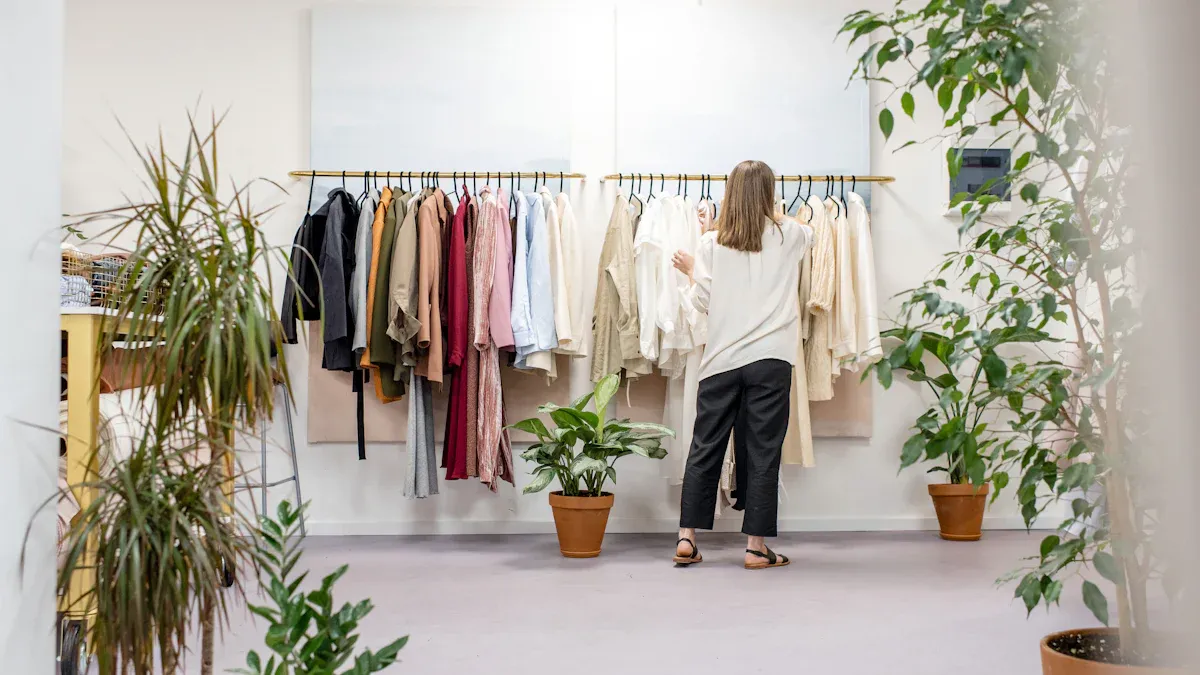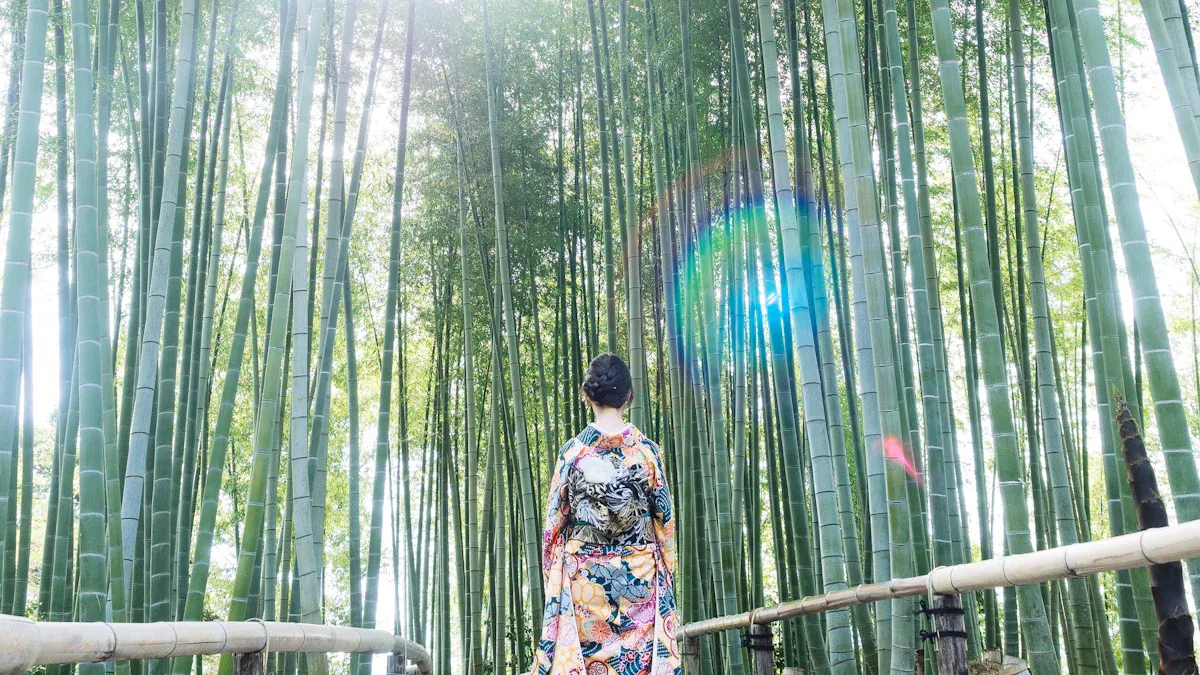
Bamboo fiber stands out as a remarkable material for clothing due to its unique blend of comfort, functionality, and sustainability. Its soft texture, often compared to silk or cashmere, feels gentle against your skin. The fabric’s breathability and moisture-wicking properties keep you dry and comfortable throughout the day. Additionally, bamboo fiber offers natural antibacterial qualities, reducing odor and promoting hygiene.
Bamboo is also an eco-friendly choice. It grows rapidly with minimal resources, making it a renewable and sustainable option for clothing. By choosing bamboo, you not only enjoy superior comfort but also contribute to a healthier planet.
Key Takeaways
- Bamboo fiber clothes are super soft and kind to skin. They feel fancy, like silk or cashmere.
- Bamboo fabric is naturally good for sensitive skin and fights bacteria. It also helps stop bad smells.
- Bamboo clothes pull sweat away, keeping you dry and comfy when active.
- Picking bamboo fiber helps the planet. It grows fast, needs no chemicals, and breaks down naturally.
- Bamboo clothes work for many styles, from sportswear to dressy outfits. They are a smart choice for any closet.
Comfort and Skin Benefits

Soft and Gentle on Skin
Bamboo fiber clothing feels incredibly soft and smooth, often compared to luxurious fabrics like silk or cashmere. This softness comes from the natural structure of bamboo fibers, which lack the rough texture found in some other materials. You’ll notice how gentle it feels against your skin, making it a perfect choice for everyday wear.
- Bamboo fabric offers a silk-like texture while being more affordable and durable.
- Its smooth surface reduces friction, preventing irritation even for sensitive skin.
- Many people describe bamboo clothing as feeling like a second skin.
If you’re looking for clothing that combines comfort with elegance, bamboo fiber delivers both effortlessly.
Hypoallergenic Properties
Bamboo fiber is naturally hypoallergenic, making it ideal for individuals with sensitive skin or allergies. Unlike synthetic fabrics, bamboo clothing doesn’t rely on harsh chemicals during production. This ensures that your skin stays free from irritants.
- Bamboo fabric is suitable for those with conditions like eczema or psoriasis.
- Its antibacterial properties help reduce odors and prevent bacteria that can irritate the skin.
- The smooth fibers minimize the risk of allergic reactions, offering a soothing experience.
By choosing bamboo clothing, you can enjoy a fabric that prioritizes your skin’s health and comfort.
Thermal Regulation for All-Season Wear
Bamboo fiber adapts to your body temperature, making it a versatile choice for any season. Its natural structure allows air to flow freely, keeping you cool in summer and cozy in winter. This unique property ensures that you stay comfortable no matter the weather.
Bamboo fabric acts as a natural climate control system:
- It wicks away moisture during hot weather, keeping you dry and fresh.
- In colder conditions, it traps body heat to provide warmth.
Whether you’re lounging at home or exploring the outdoors, bamboo clothing keeps you comfortable all year round.
Practical Advantages for Daily Use
Moisture-Wicking and Odor Resistance
Bamboo fiber excels at keeping you dry and fresh throughout the day. Its natural structure includes micro-sized oval pores that quickly absorb and evaporate moisture. This makes bamboo clothing three times more absorbent than cotton. Unlike chemically treated fabrics, bamboo wicks moisture away from your skin without relying on artificial additives.
- Bamboo fabric prevents sweat from clinging to your body, ensuring comfort during physical activities.
- Its natural odor resistance comes from antibacterial properties that stop the growth of mold and mildew.
- You’ll notice how bamboo clothing keeps you feeling clean and confident, even after long hours of wear.
By choosing bamboo fiber, you can enjoy clothing that combines superior moisture management with lasting freshness.
Antibacterial and Mold-Resistant Properties
Bamboo fiber offers remarkable antibacterial benefits, making it a hygienic choice for daily wear. Studies show that bamboo fabric eliminates 75% of bacteria within 24 hours. It even retains these properties after multiple washes, as demonstrated by research from Zhejiang Forestry University.
| Study | Findings |
|---|---|
| Bamboo Fiber Fabrics | 75% of bacteria eliminated within 24 hours. |
| Zhejiang Forestry University | Over 70% reduction in bacteria like Staphylococcus aureus and Escherichia coli after multiple washes. |
Compared to synthetic fabrics, bamboo is more breathable and doesn’t trap sweat or bacteria. This reduces the risk of skin irritation and keeps your clothing fresher for longer.
UV Protection for Outdoor Activities
Bamboo clothing provides excellent UV protection, making it ideal for outdoor use. Its natural fibers can achieve UPF ratings of 20 to 50 or more, blocking up to 98% of harmful UVA and UVB rays. This level of protection surpasses that of many conventional materials, including cotton.
- Bamboo fabric shields your skin from sun damage, reducing the risk of burns and long-term harm.
- Its UV-blocking properties make it a practical choice for outdoor enthusiasts and everyday wear.
With bamboo fiber, you can enjoy the outdoors while staying protected from the sun’s harmful rays.
Durability and Longevity
Retains Shape and Quality
Bamboo fiber clothing stands out for its ability to maintain its shape and quality over time. Unlike some fabrics that stretch or sag after repeated use, bamboo fibers have excellent elasticity. This ensures that your clothing retains its original fit and structure, even after frequent wear.
- Bamboo fabric resists shrinking and stretching, making it a reliable choice for long-term use.
- Its natural strength helps it maintain a polished appearance, even after multiple washes.
You’ll notice that bamboo clothing continues to look and feel great, providing lasting value for your wardrobe.
Resistant to Wear and Tear
Bamboo fiber offers impressive resistance to wear and tear, making it more durable than many other fabrics. Its inherent strength and elasticity contribute to its resilience, ensuring that your clothing withstands daily use.
- Bamboo socks, for example, last longer than cotton socks due to the robust nature of bamboo fibers.
- The fabric maintains its integrity even after repeated laundering, resisting fraying and thinning.
- Bamboo fibers also provide superior UV protection, with a penetration rate of just 0.06%, compared to cotton’s 2.5%.
| Test Type | Purpose |
|---|---|
| Tensile Strength Testing | Measures the strength of bamboo fibers, ensuring durability in clothing. |
| Hardness Testing | Assesses the ability of bamboo products to resist everyday wear and tear. |
With bamboo clothing, you can enjoy garments that endure the demands of your active lifestyle.
Suitable for Frequent Washing
Bamboo fiber clothing is designed to handle frequent washing without losing its quality. Its durability ensures that it maintains its antibacterial properties and structural integrity through many wash cycles.
- Bamboo fabric withstands regular machine washing without showing signs of deterioration.
- It is best to use a gentle cycle with cold water to preserve the fabric’s softness and longevity.
You’ll appreciate how bamboo clothing stays fresh and intact, even after countless washes. This makes it a practical and dependable choice for your everyday wardrobe.
Sustainability and Eco-Friendliness

Renewable and Fast-Growing Resource
Bamboo stands out as one of the most renewable resources on the planet. Its rapid growth rate makes it a sustainable alternative to traditional crops and trees. Bamboo can be harvested within three to five years, much faster than eucalyptus or hardwood trees, which often take decades to mature. This quick replenishment ensures a steady supply without depleting natural resources.
Unlike many other crops, bamboo thrives without irrigation, relying solely on rainfall. It also requires no fertilizers or pesticides, making its cultivation eco-friendly and less resource-intensive. Bamboo’s self-sufficiency reduces the environmental strain caused by water-intensive crops like cotton.
🌱 Did you know? Bamboo produces 35% more oxygen than trees of the same mass and can capture significant amounts of carbon dioxide, helping combat climate change.
Biodegradable and Low Environmental Impact
Bamboo fiber is fully biodegradable, which means it breaks down naturally without harming the environment. Unlike synthetic fabrics that can take hundreds of years to decompose, bamboo-based materials like viscose degrade within six to eight weeks. This quick decomposition reduces waste accumulation and minimizes pollution.
Bamboo fabrics consist of 100% cellulose, a natural compound that supports biodegradability. When disposed of, these fibers return nutrients to the soil, promoting a healthier ecosystem. Choosing bamboo clothing helps reduce the environmental footprint compared to synthetic textiles, which often release microplastics into waterways.
Energy-Efficient and Water-Saving Production
Bamboo fiber production is energy-efficient and conserves water. The crop’s minimal water requirement makes it one of the most water-efficient plants. Dew retting, a sustainable extraction method, uses no additional water or energy and allows nutrients to return to the soil. This process ensures that bamboo cultivation remains environmentally friendly.
Some manufacturers also use closed-loop systems during production. These systems recover up to 95% of solvents, reducing harmful emissions and waste. By choosing bamboo fiber products, you support a textile industry that prioritizes energy conservation and water efficiency.
🌍 Bamboo’s adaptability to various climates and its rapid growth make it a sustainable choice for eco-conscious consumers.
Versatility in Fashion
Adaptable to Various Clothing Styles
Bamboo fiber’s versatility makes it a favorite in the fashion industry. Its unique properties allow it to adapt to a wide range of clothing styles, from casual to high-end designs. You’ll find bamboo textiles in garments like sweaters, towels, and even bath suits. This adaptability stems from its comfort, breathability, and moisture-absorbing qualities.
- Bamboo fabric blends seamlessly with materials like organic cotton or spandex, enhancing durability and flexibility.
- Its antibacterial and UV-resistant properties make it ideal for summer wear.
- Designers increasingly use bamboo in collections, showcasing its potential in sustainable fashion.
| Demographic Segment | Key Insights |
|---|---|
| Women | Eco-conscious consumers prefer bamboo for stylish, sustainable clothing. |
| Men | Growing interest in sustainable wardrobe options drives demand. |
| Children | Parents seek organic fabrics for their kids, boosting bamboo’s popularity. |
| Unisex | Gender-neutral fashion trends highlight bamboo’s inclusivity and appeal. |
Bamboo’s ability to cater to diverse consumer preferences ensures its place in modern wardrobes. Whether you’re looking for casual comfort or elegant designs, bamboo fiber delivers.
Ideal for Activewear, Casual Wear, and Formal Attire
Bamboo fiber’s adaptability extends to various clothing categories, making it a practical choice for any occasion. Its breathability and moisture-wicking properties make it perfect for activewear. You’ll stay dry and comfortable during workouts, thanks to its ability to absorb sweat and prevent odors.
For casual wear, bamboo fabric offers unmatched softness and comfort. T-shirts made from bamboo dominate the market due to their lightweight feel and stylish appeal. These qualities make them suitable for everyday outings or relaxed settings.
In formal attire, bamboo’s smooth texture and elegant drape provide a polished look. Designers often blend bamboo with other sustainable materials to create sophisticated pieces that align with eco-friendly fashion trends. The growing demand for sustainable clothing ensures that bamboo remains a top choice for both casual and formal styles.
The bamboo clothing market continues to grow, driven by its versatility and eco-friendly nature. Whether you’re heading to the gym, enjoying a casual day out, or attending a formal event, bamboo fiber offers a stylish and sustainable solution.
Bamboo fiber offers a unique combination of comfort, practicality, and sustainability, making it an exceptional choice for modern clothing. Its silky softness ensures a luxurious feel, while its breathability and moisture-wicking properties keep you fresh and dry. The fabric’s hypoallergenic and antibacterial qualities make it gentle on sensitive skin, and its natural UV protection is perfect for outdoor activities.
| Benefit | Description |
|---|---|
| Environmental Sustainability | Bamboo grows quickly without pesticides, requiring minimal water. |
| Softness and Comfort | Provides a silky, luxurious wearing experience. |
| Hypoallergenic | Reduces irritation, ideal for sensitive skin. |
| Antibacterial and Odor-Resistant | Prevents bacteria growth and odor buildup. |
| UV Protection | Shields from harmful UV rays, great for outdoor use. |
| Biodegradable | Decomposes naturally without releasing harmful chemicals. |
Bamboo’s rapid regrowth after harvesting ensures it remains an eco-friendly resource. By choosing bamboo clothing, you support sustainable practices while enjoying unparalleled comfort and functionality. 🌱 Why not explore bamboo fiber clothing today and experience these benefits firsthand?
FAQ
What makes bamboo fiber better than cotton?
Bamboo fiber is softer, more breathable, and absorbs moisture better than cotton. It also resists bacteria and odors naturally, making it more hygienic. Additionally, bamboo grows faster and requires fewer resources, making it a more sustainable choice.
What types of clothing are made from bamboo fiber?
You can find bamboo fiber in activewear, casual wear, formal attire, socks, and even undergarments. Its versatility allows it to adapt to various styles, offering comfort and functionality for any occasion.
What care does bamboo clothing require?
Bamboo clothing is easy to care for. Use a gentle cycle with cold water when washing. Avoid bleach and high heat during drying to maintain its softness and durability. Proper care ensures your bamboo garments last longer.
What makes bamboo fiber eco-friendly?
Bamboo grows quickly without pesticides or fertilizers. It requires minimal water and produces more oxygen than many plants. Its biodegradability and low-impact production process make it an environmentally friendly fabric choice.
What skin benefits does bamboo fiber offer?
Bamboo fiber is hypoallergenic and gentle on sensitive skin. Its antibacterial properties reduce irritation and prevent odors. The fabric’s smooth texture minimizes friction, making it ideal for individuals with skin conditions like eczema or psoriasis.
